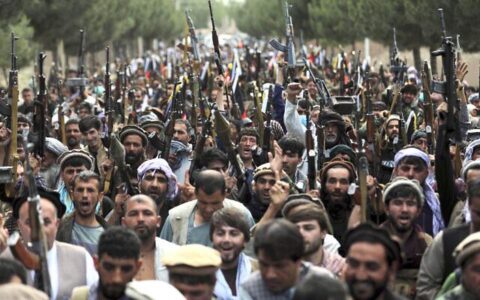
Terrorism continues to wreak havoc in Afghanistan year after Taliban takeover
The death of Al Qaeda chief Ayman al-Zawahiri in Kabul in an American drone strike last month has destroyed the image of change and stability projected by the Taliban after seizing power in the country a year ago, making it clear that Afghanistan continues to face the risk of becoming a terror haven amid the persisting threat of the Islamic State terror group.
United States’ President Joe Biden had announced that the Al Qaeda leader had been taken out by a US drone on Jul. 31 at a residence in central Kabul.
The Taliban condemned the US strike on Afghan soil and insisted that they were unaware al-Zwahiri’s presence in Kabul, without explicitly confirming the death of the terrorist leader.
Pakistani authorities had also feigned ignorance in May 2011 when Washington announced that they had killed world’s most wanted terrorist Osama Bin Laden from a hideout situated close to Pakistan’s main military academy.
After al-Zawahiri’s killing, both the Taliban and the US have accused each other of violating the 2020 Doha agreement, which paved the way for the withdrawal of US troops from Afghanistan in exchange for the Islamists pledging to not letting the country become a haven for cross-border terrorism, among other promises.
However, for the Taliban, the use of the term terrorism seems limited to the IS, which has become the main security threat in the country over the last year.
The Afghan government has tried to project a strong image and claimed that the IS presence on Afghan territory has considerably reduced, and that their capacity to act has been limited after successive Taliban operations.
“The number of ISIS fighters in Afghanistan is close to zero and they will be completely defeated in future. Their recent attacks on innocent civilians shows that they are (being) defeated,” deputy government spokesperson Qari Yousuf Ahmadi told EFE.
The Afghan defense ministry also boasted of its achievements a year after the takeover, claiming to have enlisted 100,000 soldiers and 180,000 police officers, apart from “repairing and activating 60 military aircraft” and ensuring “security throughout the country and its borders,” according to spokesperson Khurazem Shah.
Although the Islamists had promised to offer amnesty to the troops of the ousted US-backed Afghan government, extra-judicial killings among to ex-soldiers have been reported and very few of them trusted the offer.
A former member of Afghan special forces, who identified himself solely by his first name Mohamed, told EFE that he continues to live in hiding at a Kabul district less frequented by the Taliban, while hoping for an opportunity to flee the country despite being unable to secure a passport.
Mohamed, who was seriously injured in northern Afghanistan during the Taliban’s final offensive in August 2021, said he was sure to be killed if identified.
“Just in the Baghlan province, 13-14 people (former soldiers) who I knew were taken away by the Taliban. They were captured around 1 am in the night from their homes,” he said.
Many critics have alleged that the Taliban’s narrative on security full of half-truths, including the promised amnesty or the claim to have reduced the IS threat, with victims of the terror attacks – such as the Shia Hazara community – raising an alarm over their situation.
“The only thing that we could expect from the Taliban after the takeover of the country was security, but they have greatly failed in that part as well,” Khalil Kazimi, a Hazara civilian who has witnessed rising attacks on the community, told EFE.
Shias have faced repeated attacks on their mosques and educational institutes over the past year, with activists accusing the Taliban of hiding the real number of casualties and offering much reduced tolls in an attempt to underplay the threat.
The United Nations Assistance Mission in Afghanistan said in a report in July that as many as 700 people may have been killed and over 1,400 injured in attacks against ethnic and religious minorities since the Taliban seized power on Aug. 15, 2021, even though the real figures could be much higher as UN estimates are known to be conservative.
Moreover, minorities are not the only victims of the IS, a group which on Thursday claimed the assassination of well-known Taliban cleric Rahimullah Haqqani – who had backed women’s right to education and work and was a vociferous opponent of the IS – in a suicide bombing. EFE
Source: Laprensalatina





